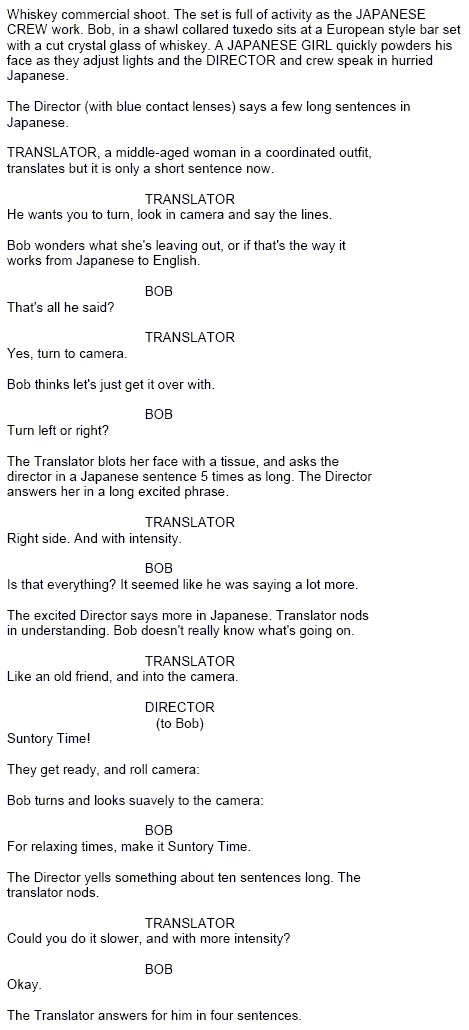|
Language Interpreter:
|
| Sign-language interpreters convert spoken communication into sign language an vice versa to facilitate communication between people with hearing problems and people who can hear well. |
- Fluency in at least two languages
- In-depth understanding of the subject matter in which they interpret
- Cross-cultural sensitivity
- Ability to express thoughts and ideas intelligibly enough while setting aside their personal opinion; attention; good memory; quick wits; analytical skills; and note taking technique
Modes of Interpretation
There are three modes of interpretation:
- Consecutive interpretation begins after the speaker has concluded speaking. The speaker pauses periodically to give the language interpreter time to interpret. While listening to the speakers, interpreters often take notes so as not to forget important points of the speaker’s message. Consecutive interpretation is intended to be heard by all participants of an event. It occurs in such settings as informal conversations, meetings, negotiations, and workshops.
- Simultaneous interpretation takes place at the same time someone is speaking. No pauses are made. The language interpreter lags about one phrase behind the speaker. Simultaneous interpretation is intended to be heard only by the listening party. So it is either whispered by the interpreter or delivered by the latter using specialized equipment (a soundproof booth, headphones and a microphone). Simultaneous interpretation takes place in such settings as international conferences, courts, and business meetings.
- Sight translation requires the interpreter to read a document/text written in one language and then orally render its meaning into the other language. It is used when there is a need for quick access to the information. It may be needed in such settings as courts, health care services, and business meetings.
| Telephone interpreting is interpretation via telephone for individuals who do not speak the same language. An interpreter, who is based in a remote location, fist listens to each speaker and then renders the speaker’s words into the other language. |
Ethical Principles
The basic principles are accuracy, impartiality, and confidentiality. All other ethical principles are based on and result from them.
Accuracy: Interpreters render the meaning of the original message into the target language in full without any distortions, omissions, explanations or additions.
Impartiality: Interpreters maintain professional distance and remain impartial, while demonstrating respect for all parties.
Confidentiality: Interpreters maintain the confidentiality of information learned during the interpreting.
Quality of Interpretation
Quality that should be expected from the professional language interpreter:
Maximum: Ability to interpret in the required mode (simultaneous, consecutive, and sight) with full and accurate rendition of the meaning. All aspects of the message – cultural context, idiomatic expressions, style, register – are conveyed without any deviations. In-depth knowledge of the specialized subject matter. Flawless interpreting: no pauses, repetitions, hesitations, or corrections. Pleasant voice and good diction.
Minimum: Adequate accuracy of interpretation. The interpreter conveys many cultural nuances, formal and colloquial speech, figurative language, and idiomatic expressions. The interpreter may stammer, may require repetition or clarification in case of the highly specialized subject matter. However, these drawbacks do not hinder successful rendering of the message.
And the quality of interpretation that definitely will not do for us is the one demonstrated by a language interpreter (called "a translator" in the script) from the Lost in Translation movie by Sofia Coppola. Here is an excerpt from this script:

Didn't find what you were looking for? Use this search feature to find it.
Return from Language Interpreter Page to Home Page
_____________________________________________________________________ Website owner: Irina Lychak, self-employed freelance linguist, Russian translator, Ukrainian translator, Kiev (Kyiv), Ukraine
|
Almost everyone would like to quit their day job, or work from home, or needs extra money. What if you could build for yourself an online business that could give a full-time income... With Site Build It! this dream can become a reality. I do not offer you another get-rich-quick scheme. I am talking about a complete and proven step-by-step process that will require your time and work. But it is a doable process that has given many people a new income and a shot at a new life. Here's some people who are doing it. Site Build It! is more than just hosting or site-building. It provides all the tools you need for getting traffic, sending out e-mails, adding a blog, and monetizing your site. And you don't have to be a techie to use it. Want to learn more? Take the Video Tour. It will show you what I mean.
Invest the most
Click, sit back, and
The process works! I know because I've done it myself. You are reading now my site built with the help of Site Build It! tools. Two years ago I have jumped at the opportunity to turn my dreams to reality and have never regretted that decision. What stops you? You can give yourself this opportunity too! Site Build It! offers a No-Risk Money-Back Success Guarantee that means you have nothing to lose. |









